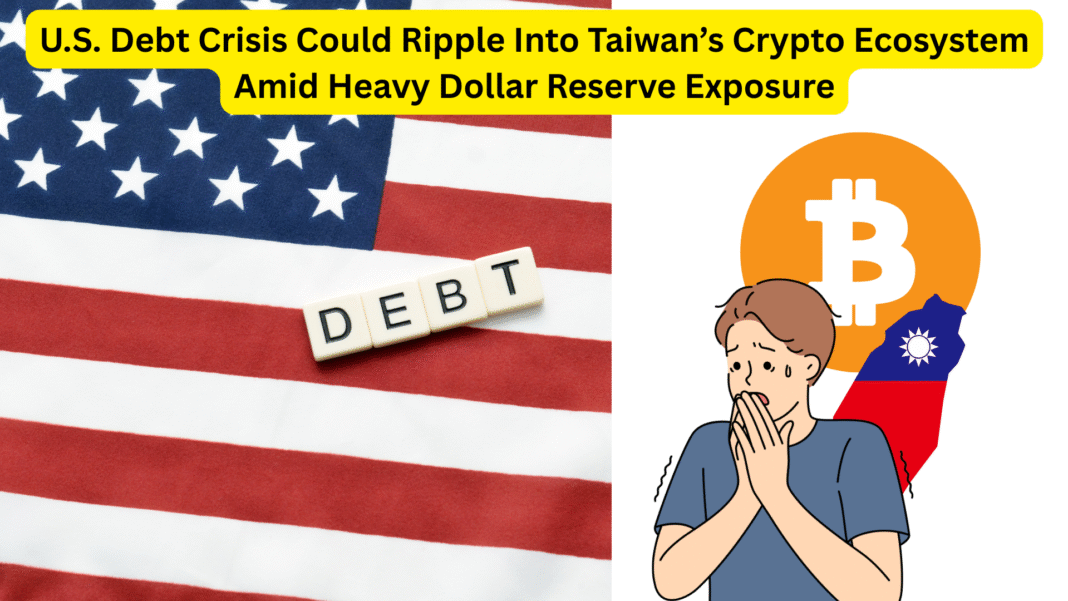The US Debt crisis may soon start spilling and affecting the crypto markets in various countries.
In this line, Taiwan’s crypto ecosystem may face unexpected turbulence as the U.S. debt crisis deepens, largely due to the island’s heavy reliance on U.S. dollar-denominated foreign reserves.
Currently, over 80% of Taiwan’s $570 billion in foreign reserves are held in U.S. assets, including Treasury bonds.
As the United States continues to grapple with mounting national debt and fiscal uncertainty, fears of inflation, interest rate spikes, or a potential downgrade of U.S. creditworthiness could have ripple effects globally—especially in economies like Taiwan that are heavily exposed to U.S. financial instruments.
Taiwan’s Crypto Sector Faces Subtle Risks Despite Strong Financial System
While Taiwan’s traditional financial system remains robust, the implications for its fast-growing crypto industry are more nuanced.
Many local crypto firms and investors indirectly depend on the stability of the U.S. dollar, either through stablecoins like USDT and USDC or through cross-border venture capital that originates in U.S. markets.
A crisis of confidence in the dollar could disrupt liquidity, reduce investor risk appetite, and complicate dollar-pegged crypto transactions.
Moreover, uncertainty in the broader macroeconomic environment could prompt Taiwan’s central bank to tighten capital flows or revise its regulatory stance on digital assets, potentially stifling innovation.
Startups reliant on foreign investment may also struggle to raise funds if U.S. markets pull back.
In essence, while Taiwan isn’t at the epicenter of the U.S. debt crisis, its deep financial ties to the American economy mean its crypto industry is not immune.
A sustained U.S. fiscal decline could create volatility, funding challenges, and regulatory headwinds for Taiwan’s digital asset ecosystem.
Taiwan Urged to Diversify Reserves to Shield Crypto from U.S. Debt Risks
To better safeguard its crypto ecosystem amid U.S. debt concerns, Taiwan can begin by diversifying its foreign reserve portfolio beyond US dollar-denominated assets.
Allocating reserves into other stable currencies, such as the euro, Swiss franc, or even gold, could reduce overexposure to U.S. fiscal risks.
Simultaneously, Taiwan should strengthen its domestic crypto infrastructure by encouraging the use of Taiwan-dollar stablecoins and enhancing blockchain innovation locally.
Building stronger financial partnerships with non-U.S. regions, such as the EU or Southeast Asia, could also diversify funding sources for crypto startups.
Regulatory clarity is equally crucial—by offering a clear, forward-looking framework for digital assets, Taiwan can attract global investors even amid macroeconomic uncertainty.
Lastly, promoting crypto education and awareness among institutional and retail participants will help build a more resilient and informed market that can better withstand global financial shocks and protect national interests in a shifting economic landscape.
Also Read: Taiwan’s BitoPro Crypto Exchange Successfully Restores $11 Million Following Major Crypto Hack
US Debt Crisis Especially Concerning as Big Billionaires Issue Warnings
With the US debt piling up heavily, many big billionaires have tried issuing warnings about the same.
On Tuesday, Elon Musk issued a stark warning on X (formerly Twitter), stating that the United States is nearing a state of “de facto bankruptcy.”
He pointed to the country’s ballooning federal debt, which has now crossed $37 trillion, as a major concern.
Musk highlighted that interest payments alone are consuming around 25% of the nation’s total tax revenue—a sign of unsustainable fiscal management.
His comments reflect growing fears among economists and investors that the U.S. government’s rising debt burden could lead to long-term financial instability, reduced public spending, and diminished global confidence in the country’s economic strength.


